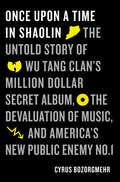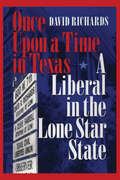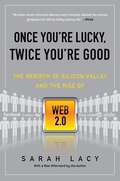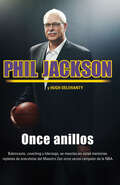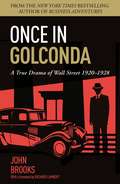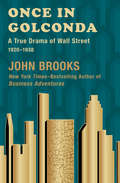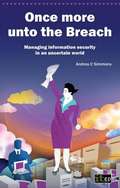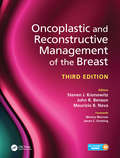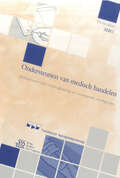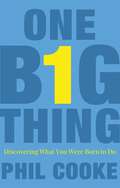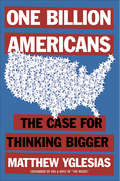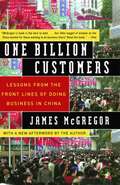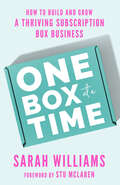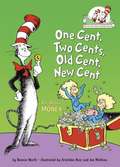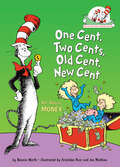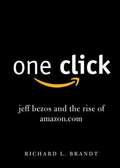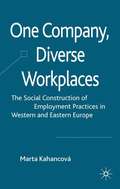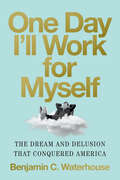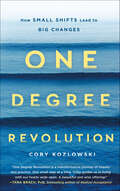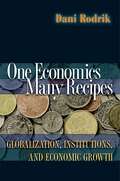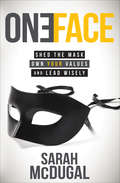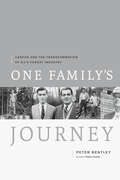- Table View
- List View
Once Upon a Time in Shaolin: The Untold Story of Wu-Tang Clan's Million-Dollar Secret Album, the Devaluation of Music, and America's New Public Enemy No. 1
by Cyrus BozorgmehrThe untold story of the world's most controversial album---a surreal tale of secret recordings, the Wu-Tang Clan, baffled customs agents, the world's most hallowed art institutions, and a villain of comic book proportions: Martin Shkreli.In 2007, the innovative young Wu-Tang producer, Cilvaringz, took an incendiary idea to his mentor the RZA. They felt that the impact of digitization threatened the sustainability of the record industry and independent artists, while shifting the perception of music from treasured works of art to disposable consumer products. Together they conceived a statement so radical that it would unleash a torrent of global debate---a sole copy of an album in physical form, encased in gleaming silver and sold through an auction house for millions as a work of contemporary art.The execution of this plan raised a number of complex questions: Would selling an album for millions be the ultimate betrayal of music? How would fans react to an album that's sold on the condition that it could not be commercialized? And could anyone ever justify the selling of the album to the infamous Martin Shkreli?As headlines flashed across the globe, the mystery only deepened. Opinions were sharply divided over whether this was high art or hucksterism---quixotic idealism or a cynical cash grab. Was it a noble act of protest, an act of cultural vandalism, an obscene symbol of greed, a subversive masterpiece, a profound mirror for our time, or a joker on capitalism's card table? As senior adviser to the project, Cyrus Bozorgmehr is uniquely placed to unlock the secrets behind the album and tell the full, unadulterated story. With explosive revelations about backroom plans made public for the first time, Once Upon a Time in Shaolin charts the album's journey from inception to disruption in vivid style.An extraordinary adventure that veers between outlandish caper and urgent cultural analysis. Once Upon a Time in Shaolin twists and turns through the mayhem and the mischief, while asking profound questions about our relationship with art, music, technology, and ultimately ourselves.
Once Upon a Time in Texas: A Liberal in the Lone Star State (Focus on American History Series)
by David RichardsOnce upon a time in Texas . . . there were liberal activists of various stripes who sought to make the state more tolerant and more tolerable. David Richards was one of them. In this fast-paced, often humorous memoir, he remembers the players, the strategy sessions, the legal and political battles, and the wins and losses that brought significant gains in civil rights, voter rights, labor law, and civil liberties to the people of Texas from the 1950s to the 1990s. In his work as a lawyer, Richards was involved in cases covering voters' rights (the creation of single-member districts to address the historic exclusion of minority voters), school finance reform (to address inequities in school funding), and a myriad of civil liberties and free speech cases. In telling these stories, he vividly evokes the "glory days" of Austin liberalism, when a "who's who" of Texas activists plotted strategy at watering holes such as Scholz Garden and the Armadillo World Headquarters or on raft trips down the Rio Grande and Guadalupe Rivers. Likewise, he offers vivid portraits of liberal politicians from Ralph Yarborough to Ann Richards (his former wife), progressive journalists such as Molly Ivins and the Texas Observer staff, and the hippies, hellraisers, and musicians who all challenged Texas's conservative status quo. Everyone fascinated by Texas politics and liberal activism in the last half of the twentieth century will enjoy this book. Written with flair and an insider's insights, it records "a sweeter time when a free-associating bunch of ragtag Texans took on the establishment at a variety of junctures," as Richards put it. Once upon a time in Texas. . . there were liberal activists of various stripes who sought to make the state more tolerant and more tolerable. David Richards was one of them. In this fast-paced, often humorous memoir, he remembers the players, the strategy sessions, the legal and political battles, and the wins and losses that brought significant gains in civil rights, voter rights, labor law, and civil liberties to the people of Texas from the 1950s to the 1990s. In his work as a lawyer, Richards was involved in cases covering voters' rights, school finance reform, and a myriad of civil liberties and free speech cases. In telling these stories, he vividly evokes the "glory days" of Austin liberalism, when a who's who of Texas activists plotted strategy at watering holes such as Scholz Garden and the Armadillo World Headquarters. Likewise, he offers vivid portraits of liberal politicians from Ralph Yarborough to Ann Richards (his former wife), progressive journalists such as Molly Ivins and the Texas Observer staff, and the hippies, hellraisers, and musicians who all challenged Texas's conservative status quo.
Once You're Lucky, Twice You're Good: The Rebirth of Silicon Valley and the Rise of Web 2.0
by Sarah LacyThe captivating story of the mavericks who emerged from the dot-com rubble to found the multibillion-dollar companies taking the Web into the twenty-first century Once You?re Lucky, Twice You?re Good is the story of the entrepreneurs who learned their lesson from the Internet bust of 2000 and in recent years have created groundbreaking new Web companies. The second iteration of the dot-coms?dubbed ?Web 2. 0??is all about bringing people together. Social networking sites such as Facebook and MySpace unite friends online; YouTube lets anyone post videos for the world to see; Digg. com allows Internet users to vote on the most relevant news of the day; Six Apart sells software that enables bloggers to post their viewpoints online; and Slide helps people customize their virtual selves. Business reporter Sarah Lacy brings to light the entire Web 2. 0 scene: the wide-eyed but wary entrepreneurs, the hated venture capitalists, the bloggers fueling the hype, the programmers coding through the night, the twenty-something millionaires, and the Internet ?fan boys? eager for all the promises to come true. .
Once anillos
by Phil Jackson Hugh DelehantyLas memorias del entrenador más laureado de la historia del baloncesto. Prólogo de Antoni Daimiel Durante su exitosa carrera como entrenador de los Chicago Bulls y Los Angeles Lakers, Phil Jackson conquistó más campeonatos que ningún otro entrenador en la historia profesional del deporte. Jackson rápidamente fue bautizado como el «Maestro Zen» por los periodistas deportivos, pero ese apodo lo único que hizo fue redundar en una verdad absoluta: la de un entrenador que inspiraba pero no provocaba, que lideraba a través de despertar retos continuamente en todos y cada uno de sus jugadores para erradicar en cada uno de ellos sus egos, miedos e iras. Esta es la historia de un joven predicador de Dakota del Norte que creció para convertirse en uno de los grandes líderes de nuestra época. En su búsqueda personal de reinvención constante, Jackson exploró muchos caminos, desde la psicología humana hasta la meditación zen practicada por los nativos americanos. En ese proceso, desarrolló un acercamiento hacia el liderazgo basado en la libertad, en la autenticidad y en la necesidad de creer en el trabajo en equipo por encima de todas las cosas.
Once in Golconda: A True Drama of Wall Street 1920-1928
by John BrooksAt noon, on September 16, 1920, a horrendous explosion rocked Wall Street, instantly claiming the lives of thirty pedestrians and seriously injuring hundreds more. Yet, for all of its awesome force, that bomb was a firecracker compared to another, much more spectacular one, several years later - the great stock market crash of 1929.Once in Golconda is a dramatic chronicle of the breath-taking rise, devastating fall, and painstaking rebirth of Wall Street in the years between the wars. Focusing on the lives and fortunes of some of the era's most memorable traders, bankers, boosters, and frauds, John Brooks brings to vivid life all the ruthlessness, greed, and reckless euphoria of the '20s bull market, the desperation of the days leading up to the crash of '29, and the bitterness of the years that followed. Writing with authority, verve, and considerable humour, Brooks introduces us to a bygone world in which the likes of Junius Morgan and fellow members of the Yankee "aristocracy" jealously controlled Wall Street as if it were their private hunting preserve. At the centre of this colourful whirlwind of a tale is the magnificently hubristic Richard Whitney. The story of his rise to the presidency of the New York Stock Exchange and his eventual downfall and imprisonment for stock fraud and embezzlement characterizes the play of monumental forces that transformed Wall Street from WASP Camelot to public institution. Though it was first published in 1969, this riveting tale explores timeless themes of profound significance for today's investors - from the corruption that led to the creation of today's securities laws to the folly of investor hubris in a bull market.'A fast-moving, sophisticated account . . . embracing the stock-market boom of the twenties, the crash of 1929, the Depression, and the coming of the New Deal. Its leitmotif is the truly tragic personal history of Richard Whitney, the aristocrat Morgan broker and head of the Stock Exchange, who ended up in Sing Sing.' Edmund Wilson, writing in the New Yorker
Once in Golconda: A True Drama of Wall Street, 1920–1938 (Pelican Ser.)
by John BrooksFrom the New York Times–bestselling author of Business Adventures comes the chronicle of the stock market crash of 1929 and its aftermathLegend had it that anyone who passed through Golconda, a city in southern India, attained tremendous wealth. But Golconda, now in ruins, ran out of riches, and its glory vanished forever. Some have painted a similar picture of Wall Street between the two world wars. But there is more to the story of the bull market of the 1920s and the ensuing economic devastation that befell the United States.In fascinating detail, distinguished journalist John Brooks recounts the euphoric financial climb of the twenties as well as the vertiginous crash of 1929. From the heady days of economic prosperity to the sobering time after the collapse, Brooks&’s rendering of this tale of vast fortune and then tragic misfortune is both dramatic and percipient. Profiling some of the era&’s most famous—and infamous—bankers, traders, and hucksters, Brooks gives a stunning and colorful account of this period of boom and bust.
Once more unto the Breach
by Andrea C. SimmonsAndrea C Simmons is an information governance specialist with extensive experience in the private and the public sectors. She has made significant contributions to standard developments and industry research and is currently working on a PhD in Information Assurance. For more than a decade she has been writing articles and blogs and presenting at conferences, seminars and workshops. Andrea is a member of many professional bodies and has just been awarded Senior Member status of the ISSA.
Oncoplastic and Reconstructive Management of the Breast, Third Edition
by Steven J. Kronowitz; John R. Benson; Maurizio B. NavaOncoplastic and Reconstructive Management of the Breast, Third Edition provides a comprehensive and contemporary account of techniques in oncoplastic and reconstructive breast surgery. Uniquely, this book includes short, concise chapters containing only the most critical information. Many of the chapters are entitled "My Approach" and this enables the reader to gain an insight into the clinical practice of the world's breast disease experts. The true multidisciplinary nature of the book ensures that the perspectives of all members of the breast cancer team are included. This transfer of knowledge between disciplines leads to improved patient care and the integration of multidisciplinary treatment, thus providing an educational and practical multidisciplinary breast cancer book for practicing breast cancer doctors, and trainees worldwide.
Ondersteunen van het medisch handelen mbo
by Yvonne MorsinkVerpleegkundige vaardigheden MBO Ondersteunen van het medisch handelen Werkcahier
One Big Thing: Discovering What You Were Born to Do
by Phil CookeNamed by Washingon Post as one of the top five business books for 2012.Stop being average at so many things, and become extraordinary at One Big Thing.What were you born to accomplish with your life? One Big Thing will help you discover what you were born to do and allow it to revolutionize your business, your ministry, and your life. In today's distracted, digital culture, it's harder than ever to identify your calling, get your voice heard, and achieve your dreams. To stand out and communicate your ideas and message, you need to cut through the clutter and get noticed. Making that happen means focusing on the one thing that drives you, inspires your passion, and separates you from the pack. If you've ever felt pulled in different directions or wondered what to do with your varied talents and interests, Phil Cooke will teach you the secrets of living a life-on-purpose that rises above the noise and leaves a lasting mark on the world.
One Billion Americans: The Case for Thinking Bigger
by Matthew YglesiasWhat would actually make America great: more people. If the most challenging crisis in living memory has shown us anything, it&’s that America has lost the will and the means to lead. We can&’t compete with the huge population clusters of the global marketplace by keeping our population static or letting it diminish, or with our crumbling transit and unaffordable housing. The winner in the future world is going to have more—more ideas, more ambition, more utilization of resources, more people. Exactly how many Americans do we need to win? According to Matthew Yglesias, one billion. From one of our foremost policy writers, One Billion Americans is the provocative yet logical argument that if we aren&’t moving forward, we&’re losing. Vox founder Yglesias invites us to think bigger, while taking the problems of decline seriously. What really contributes to national prosperity should not be controversial: supporting parents and children, welcoming immigrants and their contributions, and exploring creative policies that support growth—like more housing, better transportation, improved education, revitalized welfare, and climate change mitigation. Drawing on examples and solutions from around the world, Yglesias shows not only that we can do this, but why we must. Making the case for massive population growth with analytic rigor and imagination, One Billion Americans issues a radical but undeniable challenge: Why not do it all, and stay on top forever?
One Billion Customers: Lessons from the Front Lines of Doing Business in China
by James McgregorIt is well known that with a population of 1.3 billion people, China's market is moving quickly toward surpassing those of North America and Europe combined. Companies from the United States and around the globe are flocking there to buy, sell, manufacture, and create new products. But as former Wall Street Journal China bureau chief turned successful corporate executive James McGregor explains, business in China is conducted with a lot of subterfuge -- nothing is as it seems and nothing about doing business in China is easy. Destined to become the bible for business people in China, One Billion Customers shows how to navigate the often treacherous waters of Chinese deal-making. Brilliantly written by an author who has lived in China for nearly two decades, the book reveals indispensable, street-smart strategies, tactics, and lessons for succeeding in the world's fastest growing consumer market. Foreign companies rightly fear that Chinese partners, customers, or suppliers will steal their technology or trade secrets or simply pick their pockets. Testy relations between China's Communist leaders and the United States and other democracies can trap foreign companies in a political crossfire. McGregor has seen or experienced it all, and now he shares his insights into how China really works. One Billion Customers maximizes the expansive knowledge of a respected journalist, well-known businessman, and ultimate China insider, offering compelling narratives of personalities, business deals, and lessons learned -- from Morgan Stanley's creation of a joint-venture Chinese investment bank to the pleasure dome of a smuggler whose $6 billion operation demonstrates how corruption greases the wheels of Chinese commerce. With nearly 100 strategies for conducting business in China, this unprecedented account combines practical lessons with the story of China's remarkable rise to power.
One Box at a Time: How to Build and Grow a Thriving Subscription Box Business
by Sarah WilliamsLearn how to create a successful subscription box service from initial product curation to finding your audience to making it a sustainable business beyond launch.Are you dreaming about starting a subscription box? Do you have an idea for a subscription box but you just don&’t know where to start—or a loyal customer base for whom you&’d like to provide a fully curated experience? Can you imagine how bringing in regular recurring revenue would change your business . . . and your life?Sarah Williams, subscription box coach and host of the Launch Your Box podcast, takes you step-by-step through the process to start, launch, and grow your subscription box business. She shares the extensive knowledge and experience she gained as she built her own successful, seven-figure subscription box business from the ground up. Inside, you&’ll find practical, tactical, actionable steps to follow as well as best practices for:Finding and connecting with your audience Curating the perfect subscription box experience Buying, sourcing, and manufacturing products Maintaining a position of profitability from the beginning With Sarah as your guide, you'll be on your way to subscription box success . . . one box at a time!"
One Cent, Two Cents, Old Cent, New Cent: All About Money
by Bonnie WorthTHE CAT IN the Hat puts to rest any notion that money grows on trees in this super simple look at numismatics, the study of money and its history. Beginning with the ancient practice of bartering, the Cat explains various forms of money used in different cultures, from shells, feathers, leather, and jade to metal ingots to coins (including the smallest—the BB-like Indian fanam—and the largest—the 8-foot-wide, ship-sinking limestone ones from the Islands of Yap!), to the current king of currency, paper. Also included is a look at banking, from the use of temples as the first banks to the concept of gaining or paying interest, and a step-by-step guide to minting coins. A fascinating introduction is bound to change young reader’s appreciation for change!
One Cent, Two Cents, Old Cent, New Cent: All About Money (Cat in the Hat's Learning Library)
by Bonnie WorthTHE CAT IN the Hat puts to rest any notion that money grows on trees in this super simple look at numismatics, the study of money and its history. Beginning with the ancient practice of bartering, the Cat explains various forms of money used in different cultures, from shells, feathers, leather, and jade to metal ingots to coins (including the smallest—the BB-like Indian fanam—and the largest—the 8-foot-wide, ship-sinking limestone ones from the Islands of Yap!), to the current king of currency, paper. Also included is a look at banking, from the use of temples as the first banks to the concept of gaining or paying interest, and a step-by-step guide to minting coins. A fascinating introduction is bound to change young reader’s appreciation for change!
One Click
by Richard L. BrandtAmazon's business model is deceptively simple: Make online shopping so easy and convenient that customers won't think twice. It can almost be summed up by the button on every page: "Buy now with one click."Why has Amazon been so successful? Much of it has to do with Jeff Bezos, the CEO and founder, whose unique combination of character traits and business strategy have driven Amazon to the top of the online retail world.Richard Brandt charts Bezos's rise from computer nerd to world- changing entrepreneur. His success can be credited to his forward-looking insights and ruthless business sense. Brandt explains: Why Bezos decided to allow negative product reviews, correctly guessing that the earned trust would outweigh possible lost sales. Why Amazon zealously guards some patents yet freely shares others. Why Bezos called becoming profitable the "dumbest" thing they could do in 1997. How Amazon.com became one of the only dotcoms to survive the bust of the early 2000s. Where the company is headed next. Through interviews with Amazon employees, competitors, and observers, Brandt has deciphered how Bezos makes decisions. The story of Amazon's ongoing evolution is a case study in how to reinvent an entire industry, and one that anyone in business today ignores at their peril.
One Company, Diverse Workplaces
by Marta KahancováThe book offers an inquiry into the construction of employment practices in a multinational company across Western and Eastern Europe. In the complex corporate and host-country influences, social interaction between the firm and local actors is presented as the underlying social mechanism through which work practices are constructed.
One Cost System Isn't Enough
by Robert S. KaplanNo one cost system gives managers all the information they need to promote operational efficiency and produce the highest quality product at the lowest cost. Cost systems must serve three functions--inventory valuation, operational control, and product cost measurement. This system for operations management performs three functions: it reports information according to production cycles, differentiates between fixed and variable costs, and allocates costs only to cost centers directly related to production activities. A more subjective system is advised for measuring product costs, starting with interviews with supervisors and including transaction measures as well as traditional volume-related measures.
One Country, Two Systems?: Italy and the Mezzogiorno (A)
by Bruce R. Scott Jamie L. MatthewsGDP per person in northern Italy caught up with average incomes in Britain, France, and Germany in the 1970s, but incomes in southern Italy (the Mezzogiorno) fell further behind. This was partly due to cultural and societal differences that dated to the Renaissance, but even more obviously to northern dominance of the new nation in 1860 and Mafia dominance of much of the south. This case focuses on 50 years of efforts to correct this problem. Italy, with its north-south income divergence, is a good metaphor for the global economy with its divergence between First World and Third World incomes. A rewritten version of an earlier case.
One Day I'll Work for Myself: The Dream and Delusion That Conquered America
by Benjamin C. WaterhouseFrom side-hustlers to start-ups, freelancers to small business owners, Americans have a special affinity for people who make it on their own. But the dream has a dark side. “One day I’ll work for myself.” Perhaps you’ve heard some version of that phrase from friends, colleagues, family members—perhaps you’ve said it yourself. If so, you’re not alone. The spirit of entrepreneurship runs deep in American culture and history, in the films we watch and the books we read, in our political rhetoric, and in the music piping through our speakers. What makes the dream of self-employment so alluring, so pervasive in today’s world? Benjamin C. Waterhouse offers a provocative argument: the modern cult of the hustle is a direct consequence of economic failures—bad jobs, stagnant wages, and inequality—since the 1970s. With original research, Waterhouse traces a new narrative history of business in America, populated with vivid characters—from the activists, academics, and work-from-home gurus who hailed business ownership as our economic salvation to the upstarts who took the plunge. We meet, among others, a consultant who quits his job and launches a wildly popular beer company, a department store saleswoman who founds a plus-size bra business on the Internet, and an Indian immigrant in Texas who flees the corporate world to open a motel. Some flourish; some squeak by. Some fail. As Waterhouse shows, the go-it-alone movement that began in the 1970s laid the political and cultural groundwork for today’s gig economy and its ethos: everyone should be their own boss. While some people find success in that world, countless others are left bouncing from gig to gig—exploited, underpaid, or conned by get-rich-quick scams. And our politics doesn’t know how to respond. Accessible, fast-paced, and eye-opening, One Day I’ll Work for Myself offers a fresh, insightful cultural history of the U.S. economy from the perspective of the people within it, asking urgent questions about why we’re clinging to old strategies for progress—and at what cost.
One Degree Revolution: How Small Shifts Lead to Big Changes
by Coby KozlowskiInnovative, accessible, and easily implemented, One Degree Revolution is acclaimed yoga educator and leadership coach Coby Kozlowski's holistic program for self-inquiry and personal transformation. Her philosophy is deeply connected to living yoga—not just doing yoga. In fact, readers don’t need to have ever attended a yoga class to dive into this book: her thoughtful teachings are for anybody interested in learning to navigate the waves of life more skillfully and gracefully. Imagine sailing a boat with a course set for a lifetime. If that route changes by just one navigational degree, what would happen to the journey? How far from the original trajectory would we be in one year? Five years? Ten years? Twenty years? Well, we would end up in a totally different place. In much the same way, we can change the course of our life by making a one degree shift. In other words, we don’t have to change everything about ourselves or our world to make a difference.Coby inspires readers to dig deep, to ask powerful questions and to dive into the insights, experiments, and inquiries of living yoga: how can I best be with life? How can the teachings of yoga direct us to see the most aligned choices, let go of past hurts, and discover deep and meaningful connections? And what are the most skillful ways we can learn to savor all that life presents? These yoga philosophies are infused with practical strategies for creating the life you truly want and having a positive impact on the world. One Degree Revolution will guide readers to:-access infinite personal possibilities-celebrate their authentic selves and start listening to their calling-find meaning and purpose-learn to let go and trust the unfolding of life-value taking a pause and making a fresh start when needed-challenge long-held beliefs and foster transformational change-get comfortable with being uncomfortable, and-develop their communityOne degree at a time.
One Economics, Many Recipes: Globalization, Institutions, and Economic Growth
by Dani RodrikIn One Economics, Many Recipes, leading economist Dani Rodrik argues that neither globalizers nor antiglobalizers have got it right. While economic globalization can be a boon for countries that are trying to dig out of poverty, success usually requires following policies that are tailored to local economic and political realities rather than obeying the dictates of the international globalization establishment. A definitive statement of Rodrik's original and influential perspective on economic growth and globalization, One Economics, Many Recipes shows how successful countries craft their own unique strategies--and what other countries can learn from them. To most proglobalizers, globalization is a source of economic salvation for developing nations, and to fully benefit from it nations must follow a universal set of rules designed by organizations such as the World Bank, the International Monetary Fund, and the World Trade Organization and enforced by international investors and capital markets. But to most antiglobalizers, such global rules spell nothing but trouble, and the more poor nations shield themselves from them, the better off they are. Rodrik rejects the simplifications of both sides, showing that poor countries get rich not by copying what Washington technocrats preach or what others have done, but by overcoming their own highly specific constraints. And, far from conflicting with economic science, this is exactly what good economics teaches.
One Face: Shed the Mask, Own Your Values, and Lead Wisely
by Sarah McDugalA &“motivating, encouraging, concise, clear, effective and efficient&” primer for anyone who wants to live, work, and find success as their true self (Jason O&’Rourke, Hospital Chaplain, US Army Special Ops). Are you missing out on future success because your internal values are out of alignment with your external message? In One Face, Sarah McDugal takes you on a journey of personal discovery and growth, showcasing stories of wildly successful entrepreneurs and professionals who are committed to leading with transparency and living with a clear, honest, and singular purpose. Here, you will discover how to Define your personal core values.Transform even the harshest feedback into fuel for growth.Use a proven framework to make decisions you won&’t regret.Live with less stress, less guilt, and more freedom to be yourself. Utilizing the lessons in this book, you will possess a clearly defined set of core values, a four-step framework for making decisions without regret, and the tools you need to build your brand to last beyond a lifetime.
One Family Textiles: Stepping Back to Move Forward?
by V. G. Narayanan Alpana Thapar Fares KhraisThis case explores how a family business builds a board that includes independent directors that helps to professionalize and strengthen governance in the company. The case relates to One Family Textiles, an Abu Dhabi-headquartered manufacturer of garments. The company was founded in 1975 by Adnan Kalam and his elder brother Ali Kalam; two Kenyan nationals with Indian roots. The company enjoyed impressive growth, and by the early 1980s had several factories in the South-Asian sub-continent and sold to businesses in Asia, the Middle East, North America, and Europe. By the mid-1990s, members of the second generation joined the family business and pushed Adnan to further professionalize the company and strengthen its governance practices. Accordingly, the family sought the help of consultants and hired experienced senior executives, two of whom (first in 2014, and then in 2018) were appointed as the first independent directors of the advisory board. Over the next two years, the board focused on helping revamp operations and instilling sound governance measures. By January 2020, Adnan had stepped back from day-to-day operations and bought out his brother's stake in the company, making him the sole owner of the business. His eldest son was the group CEO and felt it was time for an IPO. The board was divided on this decision; significant improvements in professionalization and governance had been made, but the independent directors foresaw more work to be done. What should Adnan do?
One Family's Journey
by Peter BentleyPeter Bentley recounts the exciting journey shared with his esteemed father, Leopold "Poldi" Bentley, and his uncle in the building of a major forest products company.Bentley has a unique perspective on the rise and fall - and the subsequent reinvention - of western Canada's forest industry in all its complexity. He does not avoid controversy in his accounting of political shenanigans, nor does he shy away from the challenge of staring down the deep well of environmental issues. His views are those of a passionate citizen who, like his father before him, has given much of his life to the improvement of business and culture in British Columbia and Canada.An unflinching leader and a respected philanthropist, Bentley describes a colourful business career punctuated by small failures and enormous success. These thoughts are his thanks to those who inspired him and an invaluable legacy to those who follow.
